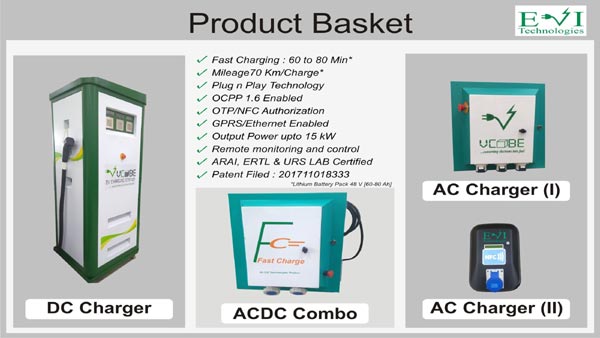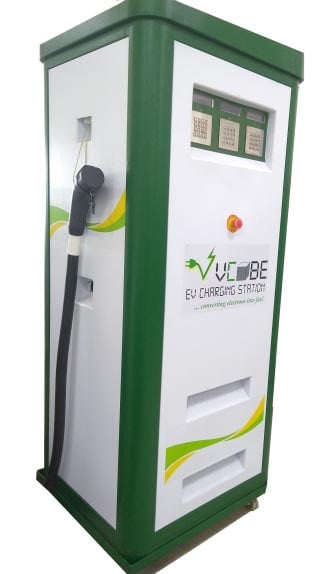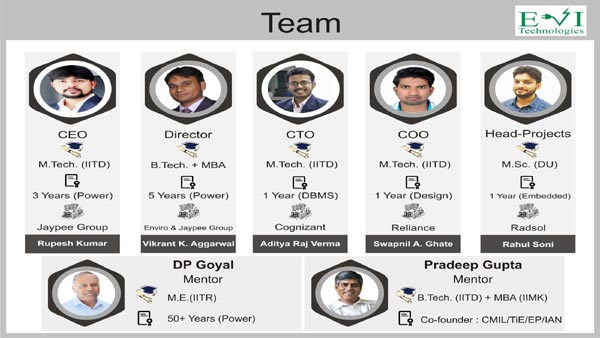
According to the BNEF forecasts, the growth of EVs in India is slow because of the shortage of charging infrastructure and lack of affordable models. The growing market of EV, demands quality charging stations across the city to support daily commute of EV users and EVI Technologies is doing exactly that.
The company which is funded and supported by the Indian Ministry of Electronics and Information Technology is currently incubated at Electropreneur Park, New Delhi. They Manufacture and supply Electric Vehicle Charging Stations to charge EV’s on the go. These charging stations have already been set-up over 30 plus different cities across India and could charge your EV’s to 100% in less than 80 minutes (for 60Ah lithium pack) while you enjoy their conveniences.
The charging stations could function completely remote through a mobile application, using which the user can turn on the charger by making the payment online. The charger then obtains the information about the users EV through CAN protocol and implements a suitable algorithm to charge EV accordingly. A single charging station could charge upto three Vehicles simultaneously and could also leverage Solar energy if feasible. Inspired by this futuristic charging station, we approached Mr.Aditya Raj who is the Technical Director and Cofounder of EVI Technologies to know more about the charging stations and he was kind enough to give us the following answers.
When did the Idea of charging Stations stuck you? And how was the company formed?
It all started in Aug’2016 in my IIT hostel room. Delhi AQI was oscillating between hazardous and severely unhealthy, while we were searching for efficient green ideas. We narrowed it down to solar PV or electric vehicle. Solar PV was a matured technology and further invention or innovation required developing efficient PV cells which involved heavy R&D and cost extensive infrastructure. Electric vehicle was still untapped region in Indian market but designing vehicle was still expensive hence we thought on building supporting framework i.e. charging infrastructure. Also the Founding members of EVI technologies came from domain of electrical, electronics, mechanical and power with good hands on industrial experience. Everything seems to be in sync hence we started working on design and development of a charging station.
What are the models/types available in these charging stations?
EVI Technologies is currently floating four type of EV charging unit in its product basket
1. EV AC Charging Unit (3 Charging Points) - It is 10kW system capable of charging 3 vehicle simultaneously with 3 phase input requirement. It is designed as per AC001 standard. We have supplied 50nos to government of India in its first tender.
2. EV AC Charging Unit EVIgo Grid(1 Charging Point) - It is single phase 12kW level 2 ac charging unit designed with consideration for easy to install with less space requirement. Further it features smart card mode of authorisation for easy to operate. The system is capable delivering 60 amps of continuous current enabling fast charging feature
3. EV ACDC Combo Charging Unit – This unit is designed to cater all kind of EV currently running on Indian roads with feature of AC as well as DC charging point. The design has a smaller form factor and wall or pedestal mounting feature
4. EV DC Charging Unit – This is dedicated high power DC charging unit with power rating upto 20kW delivering 200 amps of DC current. Further it feature communication port as per DC001 standards for EV BMS to charger communication. The input is 3 phase is capable of fast charging 1 electric car or 3 electric 3 wheeler simultaneously.

How did the first prototype charger look like? How long did you take to develop it?
The development took around 9 months for first prototype as we were fortunate to be selected under MeitY programme which provided power lab facilities with tools and test benches which saved a good amount of time.

How compatible are these charging stations? Can it support all types of EV?
Our EV AC Charging both 1 and 3 sockets can cater all kind of Electric vehicle i.e. 2 wheeler, 3 wheeler and 4 wheelers. EVI Technologies EV AC charging 3 socket currently installed at Ministry of Power Complex, New Delhi is delivering energy to Mahindra Verito and Tata Tigor EV, the Indian EV variants running on roads.
AC/DC combo charger can also charge 3W, 2W, 4W over AC point and fast charge 3W,2W over DC point.
EVI’s DC charging unit is capable of fast charging 2W, 3W, 4W with maximum DC power delivery of 20kW.
What are the pre-requisites if I am interested to set up a franchise with EVI Tech and how does it work?
Just to brief it up in bullets are as follows:
- Should have a basic EV charging installation infrastructure i.e. land, commercial electricity connection (EVI can support on revised tariff rate and new connection) and resources. Site survey is done by EVI Technologies
- Should install a minimum number of chargers (number is decided on what product franchise has chosen)
- EVI can co-invest in setting up the EV charging unit with revenue sharing model
- A token of security deposit is received in advance by EVI Technologies as per formal agreement.
Will these chargers be more efficient and faster than the one provided by manufacturer along with the EV?
The general misconception prevailing in market is EV charger must be faster or else it is not worthy. The fast charging is function of battery chemistry and independent of charger applied. If ‘x’ kWh battery is connected to ‘4x’ kW charger. In case where battery can absorb ‘4x’ kW charger can charge the battery full in 15 minutes. But battery commercially used for EV support maximum of ‘x/2’ kW hence even with high rated charger the time for complete charge shoots to 2 hours.
EVI DC charging units are developed with SiC based power MOSFETs achieving efficiency over 96% at loading capacity window of (30-98%) as compared to existing charger provided by manufacturer i.e. just 80% efficient at only 90% loading capacity. Further onboard rectifiers on EV 4W have lower power rating and efficiency at that form factor slowing charge rate where as EVI DC charging unit provide higher efficient DC power accelerating charge rate
What is OCPP Protocol and why do charging stations need them?
Open Charge Point Protocol is an open source protocol for communication between EV Charging unit and Central Server. It was developed by E-Laad group in Netherlands with an aim to build an open application protocol that can be used by any EV charging manufacturer without worrying on server vendor.
The purpose of implementing OCPP is the single time development for EV charging manufacture with support to all kinds of EV charger variants across globe. OCPP enables creation of a large-scale, visible network that uses a range of different charging with single application protocol scheme
What is the Maximum Output Current and Voltage rating of the chargers?
For EV AC charging unit it is rated at 12 kW with maximum current delivering capacity of 60amps of continuous charge current. As per global standards this charger falls in category of level 2- fast AC charging unit
For EV DC charging unit we have 20kW rated charger delivering 100Vdc and 210A dc for charging EV 4W over fast charging port
In which city do you find a great demand for these charging stations and why?
As per current statistics major metros like Delhi, Kolkata, Lucknow, Kanpur, Patna have significantly higher number of EV running on roads. These locations are suits a good demand of building network of EV charging network. Fortunately EVIT’s has already installed charger in majority of these cities. Further tier 2 cities like Raipur, Bhopal are also have good rise in EV count and EVI has already installed charger and planning to expand network for infusion of more EV on roads.
The requirement of EV charging unit is direct function of EV’s on roads and with better charging infrastructure people choices can be inclined towards EV based travel. Therefore it’s vice versa too i.e. EV on roads is direct function of EV chargers available
Tell us about your R&D Team and how does your work environment look like?
The team is good mix of engineers from major streams of engineering with industrial experience and passionate character. Further founder members are batch mates shared same campus and have strong bonding and better coordination. Attached below is glimpse of team of EVI
As EVI technologies work culture is flexible and lively. Interactions and appreciations are prime principle of EVI enabling it to perform and achieve in such s short span of time. As a start up we believe in building cost effective products to carter our customer and team is always willing to customize designs to suit client’s requirement.

What according to you was the hardest thing in developing a Charging station for EV?
To brief on challenges we faced in developing our charger:
- There were no Indian standards available for charger architecture and power ratings. In Dec’2017 first draft was rolled by ARAI as AIS138 but still no fixed standard protocols or design requirements
- There is no standard charging coupler used by EV on Indian roads making difficult to design charger coupling socket
- Component procurement and technical support was sluggish increasing product development time and cost
From where do your source components like cables and semiconductors for your charging stations? How was your experience in setting up the supply chain?
The challenge in sourcing components from manufacture was difficult because of MOQ and lead times. We coordinate with third party distributor to procure the required components which incurs additional cost and increasing development cost. Further, maximum components are German or American based hence distributor network was difficult to search and select.
Supply chain establishment taught us many things as a growing start up firm. The experience was beneficial because with new challenges coming each day in initial time made us to explore better sourcing network. Hence, today EVI has a very small but efficient supply chain network and lead times drastically reduced to less than a week for majority of components enabling faster product development and market capture.
How do you see the scope for EV in India? What is your personnel favourite EV on Indian road and why?
A.T. Kearney reports an astonishing figure of 1.5 million registered electric 3 wheelers till June’2017 without any government support and policy intervention. This kind of steady growth of 9% every year sincerely highlights the positive and accelerated growth of EV in India. Our hon’ble PM has already rolled out FAME II (Faster Adoption and manufacturing of electric and hybrid vehicles) is indicative of government’s keen interest on supporting EV on Indian roads. Many state governments have already rolled their EV policies with Delhi being the first, pushing a positive growth in EV. Further for EV charging franchise, government has already waived of any licensing requirement and subsidised the electricity tariff. In my opinion the growth will accelerate as government is also keen on building charging infrastructure to backbone EV’s on road and subsiding & exempting taxes for EV drivers.
Well, any vehicle with a battery and motor can be my favourite EV as its silent and greener mode to travel. I don’t have any personnel favourite but would love to drive every EV on Indian road

